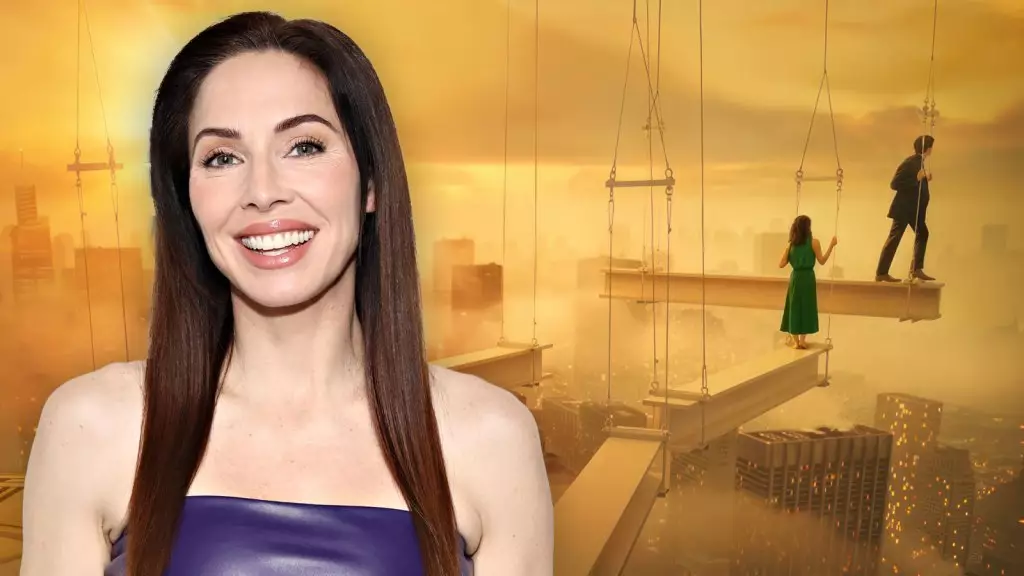In the world of entertainment, the path to success is often paved with a multitude of auditions, many of which become memorable for reasons that range from the exhilarating to the downright embarrassing. One such instance is narrated by comedian Whitney Cummings, a figure known not just for her stand-up comedy but also for her sharp wit and insightful commentary on life in the entertainment industry. Recently, she opened up about a particularly cringe-worthy audition for Francis Ford Coppola’s ambitious film, Megalopolis. Her recounting is not merely the sharing of an awkward moment; it encapsulates the immense pressure actors face, the unpredictability of creative processes, and the psychological toll of the audition process itself.
For Cummings, preparation was key. She invested significant time and energy in memorizing her lines, an essential step that demonstrated her commitment and professionalism. However, upon arriving at the audition, she immediately sensed a shift in energy that filled her with apprehension. In interviews, she described an atmosphere that was surprisingly tense and void of the usual casualness one might expect in such settings. This stark difference shook her confidence as she entered a space that was laden with unspoken rules and expectations. The typical chatter and camaraderie that often break the ice in auditions were conspicuously absent, heightening her sense of unease.
What followed was an experience Cummings would later describe as surreal and disorienting. Instead of proceeding with the scripted scenes she had painstakingly memorized, Coppola introduced a completely novel approach: improvisation. In a situation where she felt vulnerable, the request to improvise threw her into a whirlwind of unexpected character roles. From bidding farewell to a son going off to war with an English accent to confronting a husband in an Australian accent, the prompts were bizarre and left her feeling unsteady. The absurdity of the situation made her question whether she was the subject of an elaborate prank, a notion that only added to her bewilderment.
As the audition progressed, she experienced a phenomenon familiar to many who have faced high-stress situations: disassociation. Instead of commanding the room with her performance, Cummings found herself “glazing over.” This emotional detachment serves as a protective mechanism, one that can shield individuals from the stark realization of their embarrassment but simultaneously renders them unable to perform effectively. In her recounting, she laid bare this very struggle, highlighting a universal truth about the human experience: that sometimes, we become our own worst critics, particularly in high-pressure scenarios.
The conclusion of this unconventional audition left Cummings in a state of humiliation—an experience that was exacerbated by Coppola’s gesture of handing her a signed copy of his new book, a moment that felt less like an encouraging gesture and more like a reminder of the awkwardness she had just endured. His offering of a bottle of Coppola wine did little to offset her feelings, reinforcing the sense of confusion and embarrassment that lingered long afterward. Such moments reflect the complexities of navigating an industry fueled by both art and ego, where even the most experienced actors are subject to vulnerability.
Cummings’ experience is not just an isolated incident; it holds a mirror to the broader challenges actors face in pursuit of their craft. The pressures of performing under scrutiny can lead to significant emotional strain, and yet, these moments—however awkward or humiliating—are integral to developing resilience in an industry that often thrives on rejection and uncertainty. The story serves as a poignant reminder that success is not always linear, and that within every stumble lies a lesson waiting to be learned.
In closing, Whitney Cummings’ audition for Megalopolis stands as a testament to the unpredictable nature of creative endeavors. Her candid reflection provides not only insight into her character as a performer but also invites the audience to consider the myriad of challenges that come with artistic aspiration. Ultimately, it is these very experiences, both humiliating and enlightening, that shape artists and contribute to their eventual success.


Leave a Reply